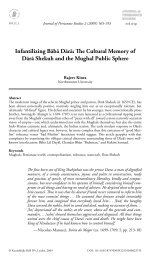The Mughals, the Sufi Shaikhs and the Formation of the Akbari ...
The Mughals, the Sufi Shaikhs and the Formation of the Akbari ...
The Mughals, the Sufi Shaikhs and the Formation of the Akbari ...
Create successful ePaper yourself
Turn your PDF publications into a flip-book with our unique Google optimized e-Paper software.
FORMATION OF THE AKBARI DISPENSATION 173<br />
He disapproved <strong>of</strong> several features <strong>of</strong> prevailing <strong>Sufi</strong> culture that<br />
lent strength to some important features <strong>of</strong> <strong>the</strong> <strong>Akbari</strong> dispensation.<br />
He also hinted that it was purification <strong>of</strong> things Indian <strong>and</strong> <strong>the</strong>ir<br />
redefinition that <strong>the</strong> mission <strong>of</strong> his coming to Hindustan was. Nowhere,<br />
however, did he actually comment upon <strong>the</strong>ir legality or illegality, let<br />
alone pronouncing a verdict on <strong>the</strong> very faith <strong>of</strong> <strong>the</strong> emperor. On<br />
this question, his approach seems to be different from <strong>the</strong> one we<br />
generally associate with his noted disciple, Shaikh Ahmad Sirhindi.<br />
Can we assume that this was because he died prematurely, leaving<br />
his mission incomplete while still mobilizing his strength We are<br />
discouraged from following this line <strong>of</strong> speculation by <strong>the</strong> fact that<br />
Sirhindi, howsoever powerful he may have been, was not <strong>the</strong> sole<br />
spokesman <strong>of</strong> <strong>the</strong> Naqshb<strong>and</strong>i order after his death. But this is a<br />
major question which still dem<strong>and</strong>s careful examination, <strong>and</strong> which<br />
should be dealt with elsewhere.<br />
Conclusion<br />
This essay has traced <strong>the</strong> relationship between <strong>the</strong> Mughal dynasty<br />
in India <strong>and</strong> various groups <strong>of</strong> <strong>Sufi</strong> shaikhs over <strong>the</strong> course <strong>of</strong> <strong>the</strong><br />
sixteenth century. Ra<strong>the</strong>r than focusing exclusively, or even largely, on<br />
<strong>the</strong> Naqshb<strong>and</strong>i–Mujaddidi tradition <strong>of</strong> <strong>the</strong> early-seventeenth century,<br />
we have attempted to look to <strong>the</strong> competition between various orders<br />
<strong>of</strong> <strong>Sufi</strong>s for influence over <strong>the</strong> <strong>Mughals</strong>. In this, <strong>the</strong> central role is played<br />
by <strong>the</strong> competitive axis between <strong>the</strong> Chishtis <strong>and</strong> <strong>the</strong> Naqshb<strong>and</strong>is,<br />
<strong>the</strong> former having exercised considerable influence over <strong>the</strong> Afghans<br />
while <strong>the</strong> latter were, in a manner <strong>of</strong> speaking, <strong>the</strong> ‘ancestral’ saints <strong>of</strong><br />
<strong>the</strong> Central Asian Timurids. We have seen how <strong>the</strong> mainstream <strong>of</strong> <strong>the</strong><br />
Ahrari Naqshb<strong>and</strong>i tradition from Transoxiana failed eventually for<br />
a number <strong>of</strong> reasons to consolidate its hold in India during <strong>the</strong> reign<br />
<strong>of</strong> Humayun, leading to <strong>the</strong> brief ascendancy <strong>of</strong> <strong>the</strong> Shattari order.<br />
Eventually, after a phase <strong>of</strong> Chishti reassertion that characterizes <strong>the</strong><br />
early years <strong>of</strong> Akbar’s rule (<strong>and</strong> his relations with both Ajmer, <strong>and</strong><br />
<strong>the</strong> more proximate figure <strong>of</strong> Shaikh Salim Chishti), <strong>the</strong> Naqshb<strong>and</strong>is<br />
were able to rally <strong>the</strong>mselves. This is in no small measure because <strong>of</strong><br />
<strong>the</strong> key role played by Khwaja Baqi-Billah, <strong>the</strong> master <strong>of</strong> <strong>the</strong> celebrated<br />
Shaikh Ahmad Sirhindi, in reinventing both an aspect <strong>of</strong> <strong>the</strong>ir <strong>the</strong>ology<br />
<strong>and</strong> <strong>the</strong>ir concrete functioning as an order.<br />
A fuller consideration <strong>of</strong> Mughal–<strong>Sufi</strong> relations would naturally<br />
take us to a proper examination <strong>of</strong> events <strong>and</strong> processes <strong>of</strong> <strong>the</strong><br />
http://journals.cambridge.org Downloaded: 15 Feb 2011 IP address: 129.174.97.34






